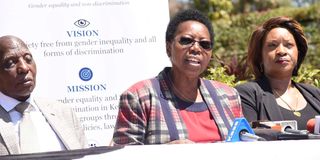Agency faults counties as few women land top jobs

National Gender and Equality Commission chairperson Joyce Mutinda addresses journalists in Nakuru City in May last year.
The National Gender and Equality Commission (NGEC) has fingered 12 counties for flouting constitutional provisions on gender representation in the senior cadres of their workforce.
The devolved units that NGEC says have flouted the two-thirds gender rule in the appointment of County Executive Committee members (CECMs) and chief officers are Isiolo, Embu, Laikipia,Kajiado, Siaya, Kericho, Samburu, Machakos, Migori, Meru, Isiolo and Tana River.
The Constitution in articles 27(8), 81(b), and 197 requires that not more than two-thirds of the members of elective and appointive bodies be of the same gender. Additionally, sections 3(g), 35(1)(2),53,58,59 of the County Government Act provides for inclusion and diversity in the workforce. The list may not be exhaustive, however, as some of the administrations are yet to fill the positions amid raging disputes over the composition of the lists.
The revelation followed queries made by nominated Senator Beth Syengo (Orange Democratic Movement) over actualisation of the two-thirds gender rule in counties. This prompted the Senate to task the Committee on National Cohesion and Equal Opportunity to undertake a human resources audit and assess the affirmative action strategies being implemented by the devolved units in the promotion of women in leadership positions.
According to a March 27 report compiled and presented by the Council of Governors before the committee, out of the six CECMs at the Isiolo County Government, only one is a female, while in Governor Cecily Mbarire’s administration in Embu County, only two CECMs are female, with eight being male. In Laikipia, six CECMs are male with only one being female with the same scenario playing out in Kajiado County.
Kilifi and Kiambu have the same number of female and male CECMs, while Kitui, West Pokot, Trans Nzoia, Nakuru, Kericho, Bomet, Kisumu, Nyandarua and Machakos have four females and six males each.
“Of counties which have completed the process of appointments (42), 88 per cent ... have complied with the ... two-third gender principle,” said NGEC chairperson Dr Joyce Mutinda.
In terms of chief officers, Migori County has only four females against 13 males ones while Siaya has just one female chief officer against nine male ones.
Kericho has two female chief officers compared to nine male ones while in Samburu, 18 chief officers are male with only four being females. Governor Wavinya Ndeti’s Machakos County has only three female chief officers against 24 males.
Meru County, which is led by Governor Kawira Mwangaza, has only one female chief officer against six males. For Tana River, only three chief officers are female while 12 are male while in Isiolo, the data places the number of chief officers at 31 where only seven are female.
Homa Bay County, led by Governor Gladys Wanga, is also not doing well where, with six appointments done so far, five are males against only one female.
In a positive development, Lamu, Kajiado, and Uasin Gishu counties have tried to balance the gender of their chief officers.
At the time of compilation of the report, Kwale, Garissa, Marsabit, Murang’a, Kiambu, Baringo, Vihiga and Kisumu counties had not made their chief officer appointments.
Nonetheless, according to the Council of Governors, county governments have put in place various affirmative action measures to ensure the realisation of the two-thirds gender rule.
Council chairperson and Kirinyaga Governor Ann Waiguru said recent appointments of CECMs and chief officers have been deliberate in the promotion of gender equality and the representation of women in leadership positions. She added that there are 144 female CECMs against 300 males across the 47 county governments while there are 192 female chief officers against 469 males in 39 counties.
“Counties have also established gender departments, affirmative action funds, gender-responsive budgets and legislations to promote the rights of women as well as capacity building of women leaders,” said Ms Waiguru





